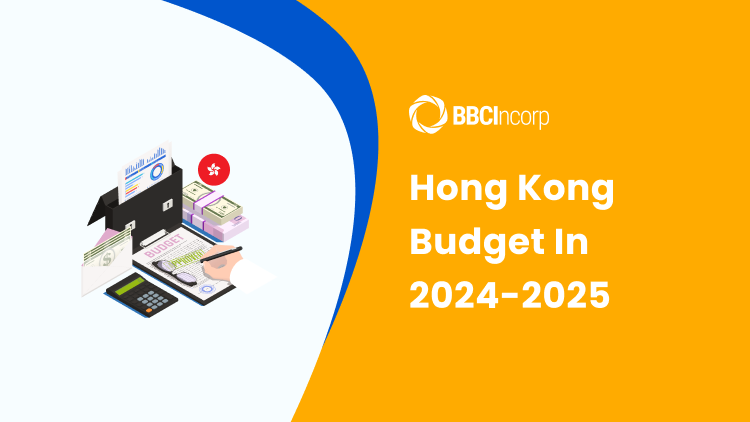
In late February, the Financial Secretary of Hong Kong unveiled the budget plan for the fiscal year 2024-2025, providing a detailed peek into the government’s anticipated revenue sources and allocated expenses.
Dive into this article as we unveil pivotal highlights from the Budget tailored for businesses and individuals in Hong Kong. Let’s explore!
Keynotes of Budget 2024–2025 for businesses
This year’s budget brings significant changes that will catch the interest of entrepreneurs and corporations. Notable points for businesses include the following:
One-time profit tax relief
The Hong Kong government proposed a one-off reduction of profits tax for the year of assessment 2023/24 by 100%, subject to a ceiling of $3,000 per case.
Taxpayers are advised to file their profits tax returns for 2023/24 as per usual. Once the necessary legislation is enacted, the Inland Revenue Department (IRD) will apply the reduction in the final assessment.
Tax deductions for reinstatement costs
Profit taxpayers can claim tax deductions for expenses spent on restoring leased properties to their original state, effective from the 2024/2025 assessment year.
Patent box tax incentive
In the initial half of 2024, Hong Kong will introduce the patent box tax incentive. This initiative will enable eligible intellectual property (IP) income from qualifying patents or patent-like IP assets to be taxed at a reduced rate of 5% in Hong Kong.
Increasing business registration fee
The business registration fee is set to rise by $200 to $2,200 annually starting from April 1, 2024. To mitigate the impact, there is a proposal to waive the $150 business registration levy for two years.
Highlights of Hong Kong property measures
Apart from business initiatives, the Hong Kong government has also proposed measures to address housing affordability and promote sustainable property development. Some notable highlights include:
Cancellation of stamp duty
Effective February 28, 2024, there will be no special stamp duty (SSD), buyer’s stamp duty (BSD), or new residential stamp duty (NRSD) required for residential property transactions.
However, sellers and buyers must still pay ad valorem stamp duty (AVD) at rates aligned with Scale 2 rates (ranging from HK$100 to 4.25% of the consideration). Residential and non-residential property transaction AVD rates are now subject to the same rate.
The amendment to the Stamp Duty Ordinance (Cap. 117) to implement this measure has been officially published. The government now has a four-month window to present the bill to the Legislative Council for its enactment into law.
Progressive rating system for residential properties
A new progressive rating system for residential properties will come into effect from the 4th quarter of 2024-2025. This system aims to boost government revenue and will impact domestic properties valued at over HK$550,000.
Furthermore, the progressive rating system will extend to domestic tenements with a rateable value exceeding HK$550,000.
Rate concessions for both domestic and non-domestic properties
Rate concessions will be expanded to cover both domestic and non-domestic properties held by corporations in the initial quarter of 2024/25. Each property can receive relief of up to HK$1,000.
Initiatives to support Hong Kong residents
For the fiscal year 2024-2025, the Hong Kong government has implemented several measures aimed at supporting individuals.
Tax reduction for individuals
There will be a significant reduction in both salaries tax and tax under personal assessment for the 2023/24 assessment year. This reduction will be 100%, with a maximum ceiling of HK$3,000, providing substantial relief to taxpayers.
Two-tiered tax rates regime
Currently, the salary tax system in Hong Kong follows a progressive scale, which is capped at 17% for chargeable income or an alternative flat rate of 15% on net income, whichever is lower.
Starting in April, a new two-tier tax system will be implemented. Under the new system, income up to HK$5 million will be taxed at a maximum of 15%, while income above that threshold will face a 16% tax rate.
Financial support for vulnerable individuals
The government will provide financial support to those in need. Eligible individuals will receive an allowance, equivalent to half a month’s standard payments from social security programs like CSSA, Old Age Allowance, and Disability Allowance. Working Family Allowance recipients will also benefit. This initiative will require an additional expenditure of around $3 billion.
Conclusion
Comprehending the Hong Kong Budget 2024/25 is crucial for all individuals and businesses, as it offers valuable insights into Hong Kong’s financial direction and priorities for the forthcoming fiscal year.
This understanding empowers stakeholders to capitalize on available support mechanisms and navigate growth opportunities more effectively, ultimately contributing to their success and the overall prosperity of the region.
Visit this site for comprehensive details on the Hong Kong Budget 2024/25.
Disclaimer: While BBCIncorp strives to make the information on this website as timely and accurate as possible, the information itself is for reference purposes only. You should not substitute the information provided in this article for competent legal advice. Feel free to contact BBCIncorp’s customer services for advice on your specific cases.
Industry News & Insights
Get helpful tips and info from our newsletter!
Stay in the know and be empowered with our strategic how-tos, resources, and guidelines.






